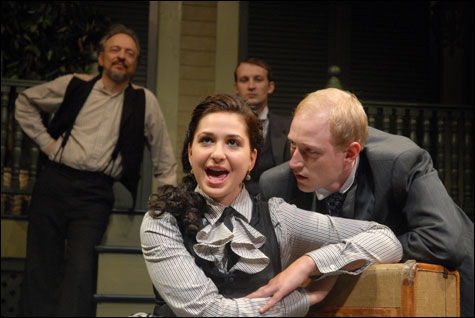
FAMILY CIRCLE: Petronio, Sherba, Crenshaw, and Jacobs. |
Although Lillian Hellman wrote Another Part of the Forest as a prequel after The Little Foxes, it was by no means an afterthought. As 2nd Story Theatre is making frighteningly clear, the Hubbards of 1880 are as fascinating to follow around as the middle-aged characters of 20 years later.
Perhaps the most interesting aspect of this production (through October 26) is that while the central characters are unsympathetic, either weak or outright villains, they are all utterly engrossing. Hellman’s skillfully told story, brought to life by superb acting and Ed Shea’s trademark snappy direction, becomes a play about family dysfunction expressed through psycho-logical gladiatorial combat.
Widely disliked businessman Marcus Hubbard (Vince Petronio) is the perfect role model for training his brood to be self-centered. He is sadistic to his sons, on the pretext of making them self-reliant. Having had to claw his way through an impoverished upbringing, he made his fortune during the Civil War by smuggling salt into the South and outra-geously overcharging. His relationship with his spoiled daughter is suspiciously affectionate, its closeness smugly encouraged by her.
At the beginning, daughter Regina (Gabby Sherba) is flaunting to her underpaid brothers, who work for their father, that daddy will of course pay for the expensive dresses she bought on a whim. But he would be upset to find out she is having an affair with former Confederate officer John Bagtry (Mark Gentsch). And he’d be apoplectic to know that she is madly in love and wants to run off with him, although Bagtry is kind but indifferent to her, preferring to prove his manhood by traipsing off to Brazil as a mercenary soldier.
Ben Hubbard (Coleman Crenshaw) is the spunky son, smarter than his brother but just as taken for granted. We first see him when he has rushed home from a business deal of his own, ordered back to his father so frivolously that the man can’t remember, so he says, why he did so. We get the idea that Daddy doesn’t exactly want his boys to get ahead.
Brother Oscar (Jonathan Jacobs) is a grown man, but he whines. He says he is madly in love with Laurette Sincee (Rae Mancini), whom Ben calls “that little whore,” to no one’s disagreement. Oscar wants money from Marcus to go off and start a business where her reputation won’t precede her. Fat chance.
The mother in this family, Lavinia (Lynne Collinson), is so ineffectual she might as well be called Old Mother Hubbard. She wants nothing more than to be allowed to go away and do missionary work among the blacks. Presumably because he doesn’t want one less servant in the house, that’s out of the question for Marcus, who encourages the general belief that her ditziness is craziness, holding the threat of an insane asylum over her head.
Much of what is impressive about this production has to do with the interesting takes on the characters. Petronio gives Marcus an internal rather than a visible glee over his making people suffer. Similarly, he doesn’t give Ben the satisfaction of seeing him lose composure when he himself is victimized; generously, he lets us provide the pain.
Sherba’s Regina could easily come across as frivolous, but instead we get intelligence behind her girlish posturing, which provides an important tension. As the hapless Oscar, Ja-cobs projects a lovelorn agony all the more comical for its seriousness. Crenshaw’s Ben is a convincing villain-in-waiting. (By the way, those two could actually be brothers, they look so spookily similar.)
Though written six years after The Little Foxes, this all takes place two decades before. By the end of the play, what will be everyone’s life situation two decades later is determined and directed by Ben. He proves himself to be his father’s son, at least regarding coldhearted ruthlessness.
The supporting cast is strong. Among them, Collinson as the long-suffering Lavinia strikes the right level of silliness without necessarily being stupid, which makes her later actions quite plausible. As Birdie Bagtry, Maryellen Brito finds a similar balance, this time between supplication and dignity, as a young woman who desperately needs a loan from Marcus to save her family’s plantation.
As usual, the costume design by Ron Cesario maintains the period mood through appropriate elegance.